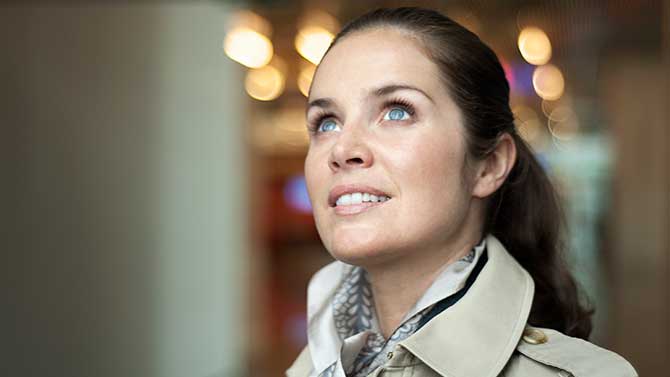
It’s our people who make the difference
Global developments and society’s changing expectations are definitely affecting the transformation that we initiated a few years ago. Back then, our focus was mainly on our internal culture and the action we were taking to become a purpose-led and values-driven organisation. We now realise that our relevance is determined not only by what we do, but increasingly by how we do things. By connecting more with the client when providing our services, we gain a greater understanding of its actual problems and we can jointly achieve better, integrated solutions.

Trust and sustained outcomes
Our transformation is about becoming aware that we all contribute by the manner in which we behave. That we integrate our values and goals into everything we do. That we trust one another and value one another’s authenticity. Creating an inclusive culture, in which people can thrive together and be themselves, combined with quality and expertise, leads to an organisation that inspires trust and ensures sustainable results.
Our strength is in our people. It’s they who make the difference, not just with their knowledge or expertise but by making connections – between people, between people and organisations, and between different organisations. That’s why we keep taking an outside look at our strategic choices.
Practice what you preach
It’s important that we practise what we preach. We will only be credible as regards the energy transition if we ourselves also have a sustainability ambition and achieve it. We can only work on risk issues if we have our own compliance and risk management in good order and we comply with the applicable rules and with society’s expectations. We will only have a say in issues regarding employment if we can show that we too are diverse and inclusive and have a future-proof personnel policy in place.
We can only take that step forward and complete our own transformation if we connect even more – with ourselves, with one another, with our clients, our ecosystems, and society as a whole. We can do so by listening better, being curious about what’s happening around us, searching out other people’s motives, and being open to the different and the new. The same applies to how we cooperate internally. It is precisely this cooperation between disciplines and viewing a problem from different perspectives that makes us stand out with integrated solutions to the challenges of today and tomorrow. We do so in the knowledge that our clients’ issues increasingly involve such major societal challenges.
Greater focus on an inclusive culture
Ensuring that different perspectives reinforce one another requires an inclusive culture. We firmly believe in the strength of such a culture. In an inclusive culture there is a sense of unity, scope for diversity, and connection between one another. By knowing yourself, listening well, being vulnerable, and being curious about other perspectives and what drives other people, we can all be true to our values.
Enhancing an inclusive mindset and inclusive behaviour creates empathy for one another. In this way, we are better able to bring different perspectives together and to collaborate more effectively. By combining our way of working (with one another, our clients, and within ecosystems) with our knowledge and expertise, we unlock our (human) potential.
Personal stories about diversity
We have been made aware of the vulnerability of diversity by the Black Lives Matter movement. That’s why we started an internal chain letter, in which colleagues openly shared personal stories. We also organised dialogue sessions about our inclusive culture, the impact of our prejudices, and how we want to connect with one another. In September we will also be introducing an “inclusive leadership badge” throughout our network, aimed at strengthening an inclusive mindset and behaviour and creating inclusive leaders.
In the Netherlands, we have started a sponsorship programme for female and multi-cultural talent. Especially among our partners and directors, the percentage of women is lagging behind our ambition. Our aim is that in ten years’ time at least 30% of our partners will be women, with the figure for directors being 35%. At present, 20% of our partners and directors are women.

Thinking along with our stakeholders
Continuing the dialogue with our stakeholders gives us a better understanding of what matters to our stakeholders, what they expect from PwC and what we need to do to meet those expectations. During discussions in the past year, they clearly indicated that we must engage with them far more, that we must involve them more in our own transformation towards a purpose-led and values-driven organisation, and that we must make clearer how we fulfil our role within society. This compels us to constantly ask ourselves how we can maintain our right to exist in the longer term.

How we continue to transform
Global trends and society’s changing expectations are also accelerating our transformation that we initiated a few years ago. More than we sometimes realise, our success is not only determined by ‘what’ we do, but also more over by ‘how’ we do it. By connecting more with the client we have a greater view on their (actual) problem. Together we then can find better, integrated solutions.

A look at our strategy
The acceleration in global changes caused by COVID-19 has led to a recalibration of our strategic vision. To meet the challenges of our time, be successful and to meet the expectations of their stakeholders, companies and organisations need to build trust and deliver sustainable outcomes. We want to contribute by developing new and sustainable solutions.
We develop these solutions by deploying a wide variety of people in unexpected combinations, by offering quality, our knowledge, creativity, and our ingenuity to look at things from multiple perspectives and by using technology. This way we build trust and create sustainable progress towards a new tomorrow. We call this sum The New Equation.

Working towards a better world after COVID-19
Now that vaccination programmes seem to have brought the COVID-19 pandemic under control and we are returning to “normal”, we are venturing to look further ahead, and we are asking ourselves what the post-COVID-19 world will look like. That world will not be entirely the same as before. Doing business, working, and living in an online environment have really taken off. Entire sectors and business models have been rendered obsolete or radically altered by the developments. There has been a change in people’s views on what makes businesses sustainably successful, and there is increased public support for strong government.

















